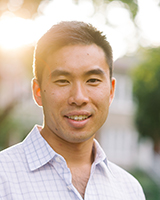Ernie Ho, PhD

Senior Business Analyst
Therapure Biopharma Inc
e. ernieho13@gmail.com
Interview:
Q: Tell us a bit about your graduate research. What were your most exciting findings?
My research investigated how scaffold and signaling proteins regulate cell polarity, shape, and motility. These are all important processes in the development, maintenance and regeneration of tissues. My most exciting finding was that specific scaffold protein complexes can function differently based on cellular context. By extension, when developing reagents for diagnostic or therapeutic purposes, how these reagents function within different cellular context and how this might affect their intended purpose should be considered.
Q: What skills did you acquire in graduate school that helped you in your current position? How did your degree give you an advantage in attaining your position?
I gained a strong understanding of biochemical, molecular, and cellular techniques, and how these can be used to test a hypothesis. Additionally, I had a lot of opportunities to hone my ability to communicate scientific principles in layman terms which has helped me when I need to explain them to non-science colleagues. These skills have also allowed me to successfully apply for and receive funding to support projects that I am currently working on. Of course, writing of any kind is a more of a breeze after publishing my thesis!
Q: Did you know when you entered graduate school that you would most likely pursue a career outside academia?
In the beginning, no. Soon after starting graduate school, however, I realized that I wanted to manage the process of getting R&D stage proof-of-concepts through to real-world marketable products. Whether this occurred within or alongside an academic career or completely outside an academic career was based on opportunities available.
Q: What is your favorite part of your job?
The opportunity to experience the amalgamation of data generation with the regulatory and real world business requirements of bringing a product to market. With this, there is so much to learn and so many "Why?" questions to ask and find answers to.
Q: How did you learn about the posting for your current job?
I got in touch with multiple professional recruitment agencies, which have a good idea of the jobs currently available in the market and what type of candidates the hiring managers are looking for. The great thing about agencies is that they do a lot of job hunting for you along with your own pursuits. The hardest part of getting these agencies to work with you is that they are usually looking for individuals that already have some non-academic work experience (as are the hiring managers).
Q: What are some specific examples of extracurricular activities (outside of research) that you participated in, which helped you get to the position you are at now?
I was always interested in business and I would follow companies by reading their annual reports, industry reports, and announcements. I was also always trying to determine what influenced the decisions they made and how different stakeholders perceived the companies and their product offerings. I discussed a lot with acquaintances that were in the business world to understand the concepts and principles they use in their daily lives and how they approached decision making.
Q: What are some suggestions for networking?
Be your natural self - you'll work best with people you are most comfortable with (and being comfortable with many types of people will help you succeed further). Networking is not all about career or industry talk - most people work, in part, so they can do other things in their spare time. Prepare before you go out networking and have a game plan (that is flexible) - try to have a defined idea of what you are looking for in a career (it's easier for the person you are conversing with to build on the conversation).
Q: What is one piece of advice you can offer to current graduate students and post-doctoral fellows?
In preparation for an industry career, try to treat your current situation like a business: what are the costs of this research and the sources of funding, what are the intangible (and tangible) outputs? Also, make sure you understand the big picture, realistically, from multiple angles and in consideration of an ever changing environment. The real world is not as well controlled as a laboratory but you can still gather sufficient data and use the power of deduction to get to a relevant conclusion. For scientific conclusions, stick to scientific methods.
Q: What does your perfect Sunday (in the summer) look like?
- Early Morning - wake up early to get some chores done, have breakfast with my wife, and go out for a walk with the dog
- Mid-Morning - go out for a session of golf or fly fishing
- Mid-Afternoon - go home for an early BBQ dinner
- Early Evening - wind down by watching a TV show, reading a book, or preparing for the next week at work all the while falling asleep on the couch








